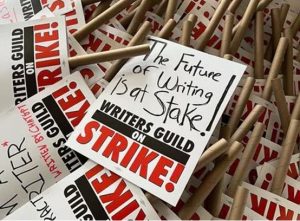Creativity seems to have lost its allure as a source of entertainment. The witty one-liners that once graced American sitcoms and TV shows now resemble an old tale. The relentless consumption of media has shaped the preferences of users, leaving TV scripts as an unusual source of entertainment. Nowadays, audiences crave fast paced and often shallow content. This shift has undoubtedly impacted not just the users themselves but also those who craft the stories, write scripts, and work in the entertainment industry. The strike of writers in Los Angeles the past month is recent evidence of this effect.
Screenwriters have enjoyed a prestigious and highly lucrative role in the television and film industry for a considerable time. However, their discontent with the current state of affairs and the treatment they receive from streaming platforms in relation to new content has intensified. In a recent interview this month, a writer named Brittani Nichols shed light on the reasons behind the recent strike in Hollywood. It appears that the writers’ concerns go beyond the popular demand for shallow and trivial content that is easily consumed; what truly bothers them is the prevailing conditions imposed on these professionals by the latest streaming platforms. The writer criticized the changing approach of streaming networks when it comes to offering writers a chance to build a sustainable career, emphasizing the lack of acknowledgment and fair compensation on these platforms.
In the past, writers used to benefit from selling the rights of their content to different television networks or distributors even after a show concluded. However, the current problem lies in the changing habits of content consumption, as audiences no longer engage in redistribution once a show ends. This shift has caused studios, focusing on streaming platforms, to overlook including writers in the profit-sharing process. Consequently, the livelihoods of writers have become increasingly unstable.
Furthermore, the rise in power and influence of streaming platforms has diminished the negotiating power of writers. This loss of leverage has become another significant factor driving the writers’ strike.
This phenomenon holds great significance within the realm of entertainment and could be referred to as “rapid media.” The kind of content we engage with may experience a surge in popularity but is quickly overshadowed by the next big thing. The speed at which audiences consume media has significantly changed compared to earlier times. This shift is evident not only in the consumption of shorter clips or posts on social media but mostly in the binge-watching trend in series. Viewers desire to consume their favorite shows as quickly as possible and yearn for thrilling content thereafter. Ultimately, it seems that nothing truly satisfies anymore, and writers are among the first to recognize this prevailing situation.

Taking effective action to address this issue is undoubtedly challenging. The reality is that it is an uphill battle to combat the allure of engaging yet superficial content that inundates every device and platform we log into. Certainly, writers aspire to resist this trend, driven by the need to preserve their careers and artistic integrity. However, for the first time, they find themselves at a pivotal moment, questioning the sustainability of the current media consumption landscape. While some may argue that this issue might not be as significant on a global scale or that scrutinizing the way we watch a series is unnecessary, it remains crucial to distinguish the quality and nature of the content being produced.
Finding a balance between artistic integrity and instant gratification is at the heart of this matter. To achieve this balance, streaming platforms must fairly compensate writers and actively pursue originality. However, there are instances, like with Disney franchises, where we see an overabundance of recycling old classics or producing sequels. It is crucial to empower writers with the freedom to take risks and present fresh, diverse content on streaming platforms. But the challenges are greater when it comes to social media. These platforms prioritize brevity, quick consumption, and viral trends, making it challenging to promote deeper and thought-provoking content. The fast-paced, endlessly scrolling nature of social media caters more to fleeting moments of entertainment rather than cultivating a sustained appreciation for artistic depth. That’s why for writers, tackling this form of unscripted entertainment may not be an immediate priority. A 2022 study by the magazine Variety showed that US viewers spend 39% of their viewing time on user-generated media. This is even more alarming for the writer’s guild if we look at teens 13-17: they spend a whopping 56% of the time-consuming user-generated content. What will happen when these youngsters become adults spending their own money?
As we anticipate the outcome of the strike in the coming months, we’ll be observing how its impact extends beyond traditional Hollywood productions to newer forms of entertainment. We remain optimistic and look forward to streaming platforms undertaking more enduring projects that provide fair compensation to writers. After all, without contented writers, the prospects of generating exceptional content in the future are unpromising.


I appreciate the effort you’ve put into maintaining this blog and sharing your knowledge with the world. Your dedication to creating meaningful and informative content is commendable.
A Writer’s Guild strike can be a powerful tool for advocating for fair compensation, working conditions, and creative rights within the industry.